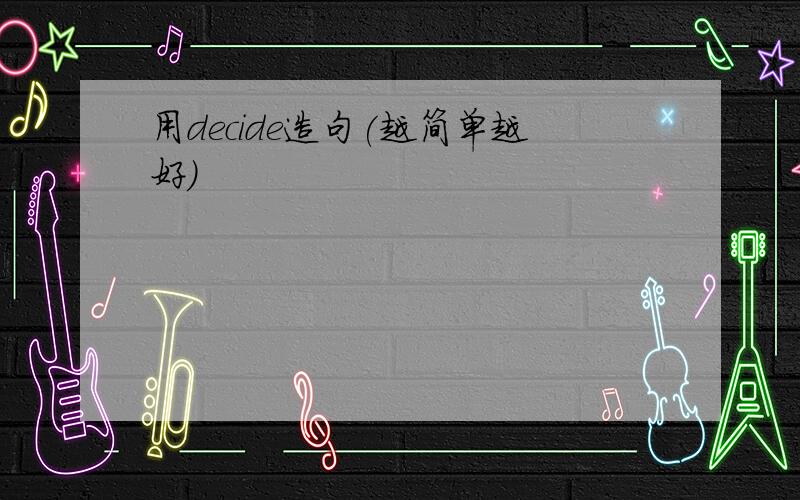用decide造句(越简单越好)
来源:学生作业帮助网 编辑:作业帮 时间:2024/11/03 04:33:17

x��R�oA�W�VZ��&c⥭�M<�
v�n\v6���*T��� �
bc�i�J�R�����pf�^�˾ �����͋� �p�����Y��{!���7,�
��d5����.����bɊ���~�� ��[
/O"��ao�ذ��ݯ'�u}'&x=�M����ʎ�**����[X5@6g`X�9d!�J�Gt�]"{Nߛ^��Yg�5��=������e�3-A1е<��`C��,a��D'u�Mo�n�/mD�dJGU��ぐqt�|�!�~!�,@hDΜ�
��K!E����7g�����A�{���K���K�cM�MN�0��
�������
V��
�u?����}%
��r�X"�BB�T>U
!c1�T�O�t|M�*�y)Qd>���^�P�
��pj��x�M�bE�d�tN'B���T� ��+R�
ES A�|���
���+5g��8ttN'mVvx�V��u�/��
�*�
ق� ^>X#^#�LT�G�
Yn���/_Q��jc������<z�^v�����Gm���ǃ`s!���l�(�����z^$4�N�(�WEN*�&�^�^�
��+
用decide造句(越简单越好)
用decide造句(越简单越好)
用decide造句(越简单越好)
decide
KK:[]
DJ:[]
vt.
1.决定;决意[+wh-][+to-v][+(that)]
They decided that John must stay there.
他们决定约翰必须留在那里.
She decided to live in London.
她决定住在伦敦.
2.使下决心;使决断[O2]
What was it that finally decided you to give up your plan?
是什么最后使你决定放弃你的计划的?
3.解决;裁决;判决
The matter has been decided.
这件事已解决.
vi.
1.决定[(+on/for/against)]
It's difficult to decide between the two candidates.
在这两个候选人中作出选择是困难的.
As to where to go,they haven't decided yet.
至于去哪里,他们还没有决定.
I decide to use the way to solve this problem.
I decided to go to park.
用decide造句(越简单越好)
用spa造句,越简单越好!
用somking造句.越简单越好.
用 decide造句
用decide on 造句
急!用like'和love造句越简单越好
用think of sb as造句,越简单越好
前后怎么造句?越简单越好
decide怎么造句.简单点的
简单成语造句草木皆兵风声鹤唳投鞭断流越简单越好(3个成语造句)
aloud怎么造句,越简单越好,要有中文翻译,
用suggest造句(动词 名词 各造一句)(越简单越好)
分别用too much、too many、much too造句越简单越好
用without造句越简单越好最好就几个单词,
用what which how when who whom 造句带翻译越简单越好
用grow out of造句 越简单越好,附中文意思!
listen sb do sth造句怎么造句、、越简单越好
用decide to do sth造句